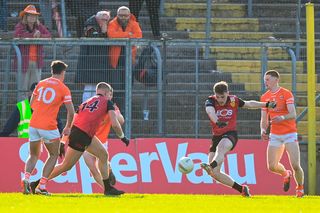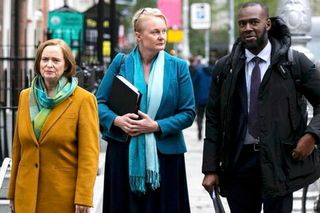Jonathan Hill’s FAI future still unclear with focus on new senior manager
FAI state appointment of Stephen Kenny’s full-time successor is still on course for April


The future of FAI CEO Jonathan Hill is unlikely to become clear until the appointment of a new senior men’s manager is finalised.
Hill has come under pressure at board level and from around the game in the aftermath of a bruising appearance in front of the Dáil Public Accounts Committee last month where there was dissatisfaction with the explanation offered for the process that led to a payment for holidays he didn’t take.
His position was on the agenda at a lengthy board summit yesterday morning, with Hill only present for the early part of the meeting.
The FAI released a short statement after the gathering which indicated it was business as usual with the CEO referenced in the context of the process to appoint a full-time successor to Stephen Kenny.
“The board of the FAI had its scheduled end of month meeting this morning and a range of issues were discussed,” read the statement.
“The process to appoint our senior men’s team head coach will now be finalised, led by the CEO and Director of Football, with an announcement planned in April as planned.”
FAI president Paul Cooke – who last month said that his confidence in Hill had been “challenged” by the holiday pay storm that led to a temporary suspension of state funding – declined to comment on the CEO’s position in a post-meeting chat with RTÉ.
However, it’s understood that there have been high level FAI talks around Hill’s situation this week and there is no suggestion that the matter is closed.
The Englishman is tied down to a long-term contract, which naturally has to be factored into consideration despite calls for a change of direction from various sectors within the game.
But the immediate priority for the FAI at this juncture is certainty around the appointment of the men’s senior team boss, with Abbotstown figures also conscious of the importance in allowing full focus on the senior women’s international with England on April 9 which promises to be a significant landmark for the game in this country on a number of levels.
With regard to the men’s vacancy, Cooke affirmed that the FAI were on course with their April plan.
“We’ve narrowed the process well down. It will be revealed in April,” he said. “We would be comfortable that the candidate will fit into our plan and processes going forward.”
Interim boss John O’Shea has faced more questions about his intentions, even though he said late on Tuesday night that he hadn’t been informed of a change in the plan laid out by director of football Marc Canham when the Waterford man was handed the keys on a temporary basis.
Canham spent several days around the Ireland camp across the double-header, which did strengthen a view around Abbotstown that O’Shea’s work was being monitored closely despite the FAI insistence that they have something sewn up.
“From the wording I’ve heard before the previous games, they said they have [a manager]. That’s my understanding of it,” said O’Shea, who has made it clear he would fancy the role. In saying that, he refused to rule out the idea of being a number two – and also didn’t quite chime with Dara O’Shea’s assessment that an individual who understood Irish football was essential.
"If I could be the manager of Real Madrid, Manchester United or Ireland in the morning, I would make it happen,” said O’Shea.
“I would give you clarity [but], I don't have it either. That [discussion at start of the process] wasn’t a scenario for me because they were talking about a manager with experience,” who then addressed the Irishness angle preferred by his younger namesake.
“Look I would have always felt that but I’ve also worked with amazing managers from different parts of the world. You appreciate, to manage a club or international team, it’s a really important skillset in terms of the balance and control of what you need, understanding squads, ages, where players can help you out, knowing the group.
“Putting all those factors together and plenty of managers from Ireland would love the job. Plenty of managers from around the world would love the job too.”
















